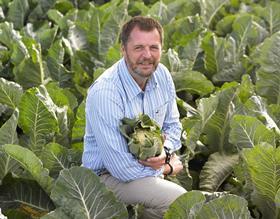
Lincolnshire brassica growers will have an added tool for disease prevention after the Syngenta Brassica Alert announced it was extending to include new light leaf spot spore monitoring.
Managed by the Alluim and Brassica Centre, Brassica Alert forecasts pathogen risks through a combination of weather data and active spore trapping for ringspot, white blister and now light leaf spot at sites in Lincolnshire.
By registering for Brassica Alert growers and agronomics can incorporate the information to devise appropriate fungicide strategies and timing.
Syngenta field technical manager, Simon Jackson said: “Historically growers would maintain fungicide programmes using Amistar Top for ringspot and white blister until temperatures dropped consistently below 10°C - typically around mid-November, but could be extended in mild autumn.
“However, light leaf spot remains active at far lower temperatures, down to 4°C, so continues to cause outbreaks right through the winter,” he warned.
“It’s of particular concern to Brussels sprout growers, with the pathogen continuing to spread further south and across Lincolnshire in recent seasons.”
This season could pose a greater danger to brassica growers, as wet weather after the oilseed rape harvest is seen as a precursor to spore release.
“Once infection is in the crop, uncontrolled it will continue to develop and spread by rain splash in wet conditions,” Jackson added.
“Knowing the risk and timing of spore infection can significantly help with preventative fungicide timing and keeping the crop clean through the winter.”
Carl Sharp, agronomist with the Allium & Brassica Centre, said that Brassica Alert has given growers greater flexibility and confidence in moving from a standard fixed interval fungicide programme, to selected targeted applications using the most suitable products for the timing.
“Our independent trials have shown that two targeted applications using Brassica Alert, gave comparative disease control, marketable yield and quality.”



